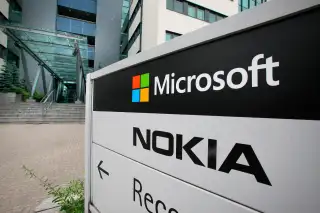Microsoft Takes a Step Down the Mobile Path

On Wednesday, Microsoft is set to unveil Windows 10, the newest version of its flagship operating system. The time has come, the company says, to introduce a “new Windows...built from the ground up for a mobile-first, cloud-first world." Most critically, the new products will make it easier for developers to build apps for mobile devices, including Microsoft's own smartphones.
The news couldn’t come a moment too soon. The onetime technology leader has been struggling to compete in mobile and media markets. Currently, Windows models account for less than 5% of phones in use. So while Microsoft wants to be seen as the fourth member of the current pack of tech titans, alongside Apple, Amazon, and Google, it still has a ways to go.
Mobile weakness notwithstanding, Microsoft remains the world’s largest software producer, with a stock market value of $381 billion (north of Google’s) and $90 billion in cash on hand. Revenue from selling and licensing products like Windows to companies—about half of Microsoft’s business—grew by an impressive 10% last quarter. Revenue from Xbox, one of the world’s most popular gaming consoles, grew more than 58%. Meanwhile, the company released its latest cellphone to positive reviews. The stock stands at a near 15-year high.
Still Facing Headwinds
A lot is riding on the success of Windows 10. Demand for personal computers has fallen off, thanks to smartphones and tablets. Sales of Microsoft’s own tablets, such as the Surface Pro 3, have picked up recently but lag far behind those of the Kindle Fire and iPad.
The company’s smartphone—$600 at its most expensive—is “too high cost, and it’s too late,” says Mary Monahan of research company Javelin. A tardy entrance gave Google and Apple valuable lead time and made Windows a less desirable outlet for app developers. “The value of the iPhone is that you get all of these great apps,” says Monahan. “When you buy a Microsoft phone, what do you get?”
The Outlook for Investors
Prospects for Microsoft aren’t ugly, but they’re not great either. While Xbox, with its legions of dedicated customers, has proven popular, analysts believe long-term success requires an untethered platform. “The future is more control of your day-to-day life with your phone,” says Monahan.
Windows 10 is part of new chief executive Satya Nadella's strategy to prioritize investments in mobile, like its 2014 purchase of Nokia’s handset division; Microsoft is likely to use its cash kitty to fund further deals.
Microsoft’s forward price/earnings ratio is near Apple’s, and it has a higher-than-average dividend yield: 2.7%, vs. 1.6% for its information-technology peers. That means investors are paid well to hold the onetime personal computing champion and wait for a turnaround. With the release of Windows 10, that reversal may be one step closer.
Read Next: Who Will Win the Battle of the Tech Titans?